Introduction
The call for a global shift towards a green economy has gained momentum in recent years, highlighting the unsustainable trajectory of our current development model. According to the United Nations Environment Program (UNEP), the green economy is defined as low-carbon, resource efficient and socially inclusive. In a green economy, growth in employment and income are driven by public and private investment into such economic activities, infrastructure and assets that allow reduced carbon emissions and pollution, enhanced energy and resource efficiency, and prevention of the loss of biodiversity and ecosystem services. The current economic model of countries heavily relies on fossil fuels and unsustainable resource extraction which poses an existential threat to planet Earth. However, green transition holds particular significance for developing countries, faced with the dual challenge of economic growth and environmental protection. Embracing a green economy is not just an option, but a necessity for sustainable development.
Importance of Green Economy for Developing Nations
Developing countries bear disproportionate consequences of environmental degradation on their economies, despite contributing less to climate change. These countries are often vulnerable to climate change impacts like rising sea levels, extreme weather events, and resource scarcity, threatening food security, infrastructure, and overall development. Reliance on resource-intensive industries causes economic dependence and vulnerability to market fluctuations. Additionally, rich natural resources can be found in many developing countries. But with little future benefit, the extractive methods that are being used will eventually result in depletion of these resources. Using a green approach ensures that resources are managed sustainably, promote economic growth and benefit future generations.

Opportunities
Transitioning to a green economy presents a unique opportunity for developing nations to break the traditional cycle. Embracing renewable energy sources like solar and wind power can enhance energy security, reduce dependence on fossil fuels, and create new jobs in the clean energy sector. Investing in sustainable agriculture practices can boost food security, protect biodiversity, and adapt to changing climate conditions. Overall, adopting the green economy is not only an environmental requirement but a strategic measure for developing nations to attain sustainable development, economic success, and social well-being.
Challenges and the Need for Support
Despite the benefits, the green transition poses significant challenges for developing countries. Limited financial resources, lack of technological infrastructure, and inadequate institutional capacity can hinder green investments and implementation. Moreover, ensuring a just transition that protects vulnerable communities and workers affected by this shift is crucial.
Green economy has the potential to improve adaptability and resilience through international support and technology transfer. With this, developing countries will be able to steer toward a more promising future by developing climate-smart infrastructure and technologies that will assist in managing extreme weather events, sea level rise, and water scarcity. Additionally, this will enable developing countries to protect livelihoods and guarantee long-term economic prosperity by preserving ecosystems and practicing sustainable resource management.
International Collaboration and Shared Responsibility
Developed countries have an important role to play in supporting developing countries in their green transition. The transition to a green economy presents numerous challenges for developing countries, the most significant of which are fiscal limits. Large upfront investments are required for the deployment of green technologies and infrastructure. Developed countries must step forward swiftly and provide financial support, particularly loans with favorable terms and conditions. Collaborative efforts on research and development in clean technologies can accelerate progress and ensure affordability. Trade agreements promoting sustainable practices and fair market access for green products can further incentivize the transition.

Furthermore, it is important that governments of developing countries set ambitious goals, formulate supportive policies and work efficiently to attract green investments from international and regional stakeholder to accelerate progress. Private sector can play a significant role in developing and deploying green technologies, investing in sustainable practices, and promoting responsible consumption. Civil society should also contribute by raising awareness, fostering community engagement, and holding governments and businesses accountable.
Conclusion
For developing countries, this transition offers a path towards achieving the Sustainable Development Goals, building resilience, and creating a future where prosperity and environmental sustainability go hand in hand. By embracing this opportunity with international support and collaboration, developing countries can collectively pave the way for a more just, equitable, and sustainable future for all nations.

Research Associate, Pakistan House



